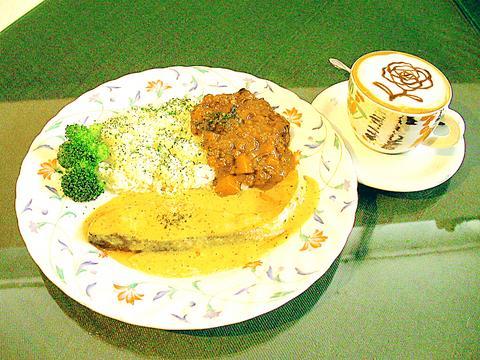La Boheme got its name from the Italian opera by Puccini. A passage describing how a flower can receive warm sunlight despite growing in an attic, says proprietor Hu Chia-yuan (
Unlike most coffee houses, La Boheme does not rely much on passing trade. But despite its out of the way location on Changan West Road, the cafe is building up a steadily clientele of genuine coffee lovers and enthusiasts of Italian cuisine. Some of them liked La Boheme's food and coffee so much that they've taken classes taught by Hu and subsequently opened their own cafes. There are also an increasing number of other establishment who simply purchase Hu's ready-made sauces and roasted coffee beans.

PHOTO: VICO LEE, TAIPEI TIMES
So that even if you've never been to La Boheme, you may have unknowingly tasted its products in other restaurants.
Hu also provides instruction on coffee making and is currently busy setting up a small factory to meet increased demand for his roasted coffee beans.
According to Hu, the secret of La Boheme's success lies in his pharmaceutical training. Although he never had any formal training as a chef, Hu experimented with many ingrediants, using the chemical properties as his guide. This knowledge helped him to bring out the best in his materials.
Salmon with clavier sauce is a popular summer dish. Like other dishes at La Boheme, it comes as a set (NT$180), with side dishes and soup. It's well worth the price as the salmon is uncommonly delicious -- hand-picked to ensure freshness and quality. To get this dish, you want to arrive early, as it sells out quickly.
The beef rib eye (NT$180 a set) is served in a northern Italian style in a strongly flavored sauce that is a blend of basamic vingar, blueberry, cheese and olive oil.
No visit to La Boheme is complete without tasting its coffee. The cafe's long coffee list has some rare blends along with the popular favorites.
Ristretto (NT$90), a kind of lightly roasted espresso bean, is just such a special variation. According to Hu, the light roasting allows the bean to retain some of the flavors -- or chemical elements, as Hu would say -- that are otherwise destroyed by heavier roasting.

That US assistance was a model for Taiwan’s spectacular development success was early recognized by policymakers and analysts. In a report to the US Congress for the fiscal year 1962, former President John F. Kennedy noted Taiwan’s “rapid economic growth,” was “producing a substantial net gain in living.” Kennedy had a stake in Taiwan’s achievements and the US’ official development assistance (ODA) in general: In September 1961, his entreaty to make the 1960s a “decade of development,” and an accompanying proposal for dedicated legislation to this end, had been formalized by congressional passage of the Foreign Assistance Act. Two

March 31 to April 6 On May 13, 1950, National Taiwan University Hospital otolaryngologist Su You-peng (蘇友鵬) was summoned to the director’s office. He thought someone had complained about him practicing the violin at night, but when he entered the room, he knew something was terribly wrong. He saw several burly men who appeared to be government secret agents, and three other resident doctors: internist Hsu Chiang (許強), dermatologist Hu Pao-chen (胡寶珍) and ophthalmologist Hu Hsin-lin (胡鑫麟). They were handcuffed, herded onto two jeeps and taken to the Secrecy Bureau (保密局) for questioning. Su was still in his doctor’s robes at

Last week the Democratic Progressive Party (DPP) said that the budget cuts voted for by the China-aligned parties in the legislature, are intended to force the DPP to hike electricity rates. The public would then blame it for the rate hike. It’s fairly clear that the first part of that is correct. Slashing the budget of state-run Taiwan Power Co (Taipower, 台電) is a move intended to cause discontent with the DPP when electricity rates go up. Taipower’s debt, NT$422.9 billion (US$12.78 billion), is one of the numerous permanent crises created by the nation’s construction-industrial state and the developmentalist mentality it

Experts say that the devastating earthquake in Myanmar on Friday was likely the strongest to hit the country in decades, with disaster modeling suggesting thousands could be dead. Automatic assessments from the US Geological Survey (USGS) said the shallow 7.7-magnitude quake northwest of the central Myanmar city of Sagaing triggered a red alert for shaking-related fatalities and economic losses. “High casualties and extensive damage are probable and the disaster is likely widespread,” it said, locating the epicentre near the central Myanmar city of Mandalay, home to more than a million people. Myanmar’s ruling junta said on Saturday morning that the number killed had